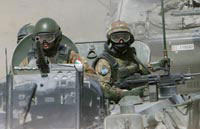Phantom Democracy in Afghanistan Needs More Victims
The international coalition forces suffered new losses in Afghanistan. This time, the losses were caused by a NATO airstrike, not the Taliban.

The airstrike was launched during an operation to search for two American soldiers who went missing last Wednesday during a routine resupply mission. Something went wrong and the strike was launched against the coalition’s own members, reported the Afghan Minister of Defense. According to other sources, seven Afghan and international soldiers died and 25 were wounded at the Bagdis Province in the western part of Afghanistan.
Such news does not inspire optimism in the members of the international coalition participating in either peacemaking or anti-terroristic operation in Afghanistan. Even the most loyal supporters of the continuation of the military presence in this country express doubts in its success.
British Prime Minister Gordon Brown admitted for the first time while in office that the Afghan mission could collapse, and called Karzai’s government a symbol of corruption.
The Daily Mail newspaper reported that Browned voiced a warning that if the military campaign in Afghanistan collapsed, the consequences would be catastrophic.
Seven British soldiers died in Afghanistan last week. However, the British Prime-Minister still insists that the presence of nine thousand British soldiers in Afghanistan is necessary for defending Great Britain against terrorists.
Brown expressed his condolences to the families of the killed soldiers and emphasized that their deaths would not cause change of strategy in the region. He appealed to the coalition to preserve unity. Brown stated that Great Britain would not abandon its Afghan mission despite the losses.
Not all British people agree with their Prime-Minister at the BBC forum.
Phil Jeffers wrote that British and Americans invaded Afghanistan, killed thousands of Afghani people, but were surprised that Afghani people were so aggressive in return. He suggested that if the situation was the opposite, British people would also be aggressive and cruel towards invaders who threatened their security and killed their family members.
John Sliford noted that the war would continue until its supporters in the Parliament begin sending their sons and daughters to the battle field. If it happened, the war would be finished within a couple of weeks, because the war supporters would turn into its opponents.
Nathan Hobbs from Luton said that in a democratic society it is the public opinion that matters and not the will of the government. British people are against the war. The troops are not Britain’s, they are Gordon Brown’s troops.
Likklepete, a forum user from Memphis, went even further saying that the officials would not withdraw the troops not to answer the question about the initial reasons of the war. Tony Blair would be deemed responsible and would have to answer before court.
Fido from London wrote thatsafety in these wars was only guaranteed for oil pipes. British soldiers die to make wealthy even wealthier.
Gordon Brown should listen to the opinions of his citizens, but he is unwilling to see the things that are already being acknowledged by American generals.
The army lacks experiences soldiers for the Afghan campaign. There is a reason why Admiral Mike Mullen, Chairman of Joint Chiefs of Staff, hinted that the USA was considering a possibility of relocating American troops from South Korea to Afghanistan.
"Certainly, that's something that we are looking very specifically at. And, in fact, there have been forces that were here that went to Iraq very early. And we're in discussion. No decisions with respect to that right now," Mullen said.
In 2004, thousands of American soldiers were sent from South Korea to Iraq to support the US Army, dozens of them died.
South Korean Ministry of Defense denies the fact of negotiation with the US Defense Department regarding potential relocation of troops. This would be the second time when troops stationed in South Korea would be sent to the Middle East.
However, a possibility of relocation of a part of the American troops currently stationed in South Korea is very likely.
Approximately 28,500 American soldiers are currently stationed in South Korea. They play an important restraining role against North Korea that is technically in a state of war with South Korea and the USA after the completion of the Korean War of 1950-1953.
Mullen believes that within seven to nine years approximately 50 percent of American soldiers stationed in South Korea would be stationed their along with their families for two to three years. Traditionally, American soldiers come to South Korea for one year.
"The concern that gets raised with respect to rotating forces out of here when we have this discussion is that it lessens the commitment to the alliance in the Republic of Korea. Nothing could be further from the truth," Mullen stated.
He added that the local challenges were, in fact, global. He emphasized that no decision has been made.
While in Seoul last week, Robert Gates, US Secretary of Defense, stated that any contribution to the stabilization of Afghanistan, including military, is welcome.
However, unlike Tbilisi and Vilnius, Seoul is not itching to send its troops to fight for an obscure Afghan democracy. However, the statement of the American Admiral made South Korean officials worry.
A representative of the Ministry of national defense stated that Mullen might have used “technical terms” and denied that a negotiation between the government and the US took place.
South Korea cannot but hope that the statement was “lost in translation.” Americans, however, have increasingly less hope for a unified coalition.
Ivan Tulyakov
Pravda.Ru
Subscribe to Pravda.Ru Telegram channel, Facebook, RSS!

